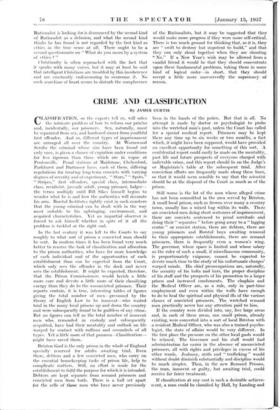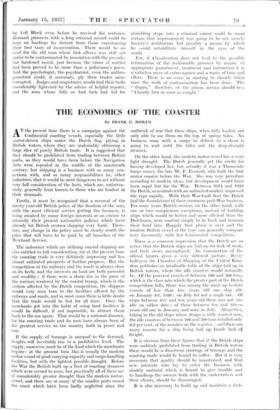CRIME AND CLASSIFICATION
By JAMES CURTIS
CLASSIFICATION, so the experts tell us, will solve the intricate problem of how to reform our prisc'•ns and, incidentally, our prisoners. Sex, naturally, must be separated from sex, and hardened sinner from youthful first offender. And so, different types of imprisonment are arranged all over the country. At Wormwood Scrubs the criminal whose sins have been found out only once, is given a chance of expiation under conditions far less rigorous than those which are in vogue at Pentonville. Penal stations at Maidstone, Chelmsford, Parkhurst and Dartmoor have, each of them, differing regulations for treating long-term convicts with varying degrees of severity and of experiment. " Stars," " Spots," " Stripes," first offenders, special class, intermediate class, recidivist, juvenile adult, young prisoner, lodger— the terms multiply until Bill Sikes himself begins to wonder what he is and how the authorities will decorate his arm. Borstal Institutes rightly exist in such numbers that the young criminal can be dealt with in the way most suitable to his upbringing, environment, and acquired characteristics. Yet an impartial observer is forced to ask himself whether in spite of it all the problem is tackled at the right end.
In the last century it was left to the Courts to say roughly to what sort of prison a convicted man should be sent. In modern times it has been found very much better to reserve the task of classification and allocation to the prison authorities, who have far more knowledge of each individual and of the opportunities of each establishment than can be expected from the Court, which only sees the offender in the dock and never sees the establishment. It might be expected, therefore, that the Prison Commissioners would lavish a little more care and devote a little more of their classifying energy than they do to the unconvicted prisoner. Their reports contain, it is true, interesting tables of figures giving the total number of men—presumed by the theory of English Law to be innocent—who waited trial in the many local prisons up and down the country and were subsequently found to be guiltless of any crime. But no figures can tell us the total number of innocent men who, remanded in custody and subsequently acquitted, have had their mentality and outlook on life warped by contact with ruffians and scoundrels of all types. Yet a little more of that panacea—Classification- might have saved them.
Brixton Gaol is the only prison in the whole of England specially reserved for adults awaiting trial. Even there, debtors and a few convicted men, who carry on the essential housekeeping tasks of prison life, help to complicate matters. Still, an effort is made for the establishment to fulfil the purpose for which it is intended. Debtors are kept separate from remand prisoners and convicted men from both. There is a- hall set apart for the cells of those men who have never previously been in the hands of the police. But that is all. No attempt is made by doctor or psychologist to probe into the wretched man's past, unless the Court has called for a special medical report. Prisoners may be kept thcre any time up to six weeks or two months, a fact which, it might have been supposed, would have provided an excellent opportunity for something of this sort. A confidential report could easily be made on the mentality, . past life and future prospects of everyone charged with indictable crime, and this report should lie on the Judge's or Magistrate's table at the subsequent trial. After conviction efforts are frequently made along these lines, so that it would seem sensible to say that the scientist should be at the disposal of the Court as much as of the prison.
Still worse is the lot of the man whose alleged crime has not been committed in the area served by Brixton. A small local prison, such as frowns over many a country town, usually has a mixed bag within its walls. There are convicted men doing short sentences of imprisonment, there are convicts sentenced to penal servitude and doing their " separates " before going away to a " lagging centre " or convict station, there are debtors, there are young prisoners and Borstal boys awaiting removal to their appropriate establishments, there are remand prisoners, there is frequently even a women's wing. The governor, whose space is limited and whose salary as the ruler of such a small, if miscellaneous community, is proportionately exiguous, cannot be expected to devote much time to the study of his unfortunate charges' warped minds. His chief preoccupations are, naturally, the security of his bolts and bars, the proper discipline of his staff and the prospects of his promotion to a larger prison and increased emoluments. The chaplain and the Medical Officer are, as a rule, only in part-time employment and even within the walls have enough to do to heal the spiritual and physical ills of the various classes of convicted prisoners. The wretched remand man practically never has any attention paid to him.
If the country were divided into, say, five large areas and, in each of these areas, one small prison, already existing, were converted into a sort of local Brixton with a resident Medical Officer, who was also a trained psycho- logist, the state of affairs would be very different. In the first place the pressure on the other local gaols would be relaxed. The Governor and his staff would find administration far easier in the absence of unconvicted prisoners, all with rights and privileges in excess of his other wards. Jealousy, strife and- " trafficking " would without doubt diminish substantially and discipline would be much simpler, Then, in the new Remand. Prisons, the man, innocent .or guilty,- but awaiting trial, could receive far fairer treatment.
If classification at any cost is such a desirable achieve- ment, a man could be classified by Hall, by Landing- and by Cell Block even before he received his sentence. Remand prisoners with a long criminal record could be kept on landings far distant from those experiencing their first taste of incarceration. There- would be no need for the old man whose first offence was still sub judice to be contaminated by association with the juvenile, but hardened rascal, just because the crime of neither had been proved to- be more than a policeman's guess. And the psychologist, the psychiatrist, even the anthro- pornetrist could, if necessary, ply their trades unin- terrupted. Judges and magistrates would find their tasks considerably lightened by the advice of helpful reports, and the man whose folly or bad 'luck had led his stumbling steps into a criminal career could be more certain that imprisonment was going to be not merely Society's retribution, but possibly a means by which he could rehabilitate himself in the eyes of the world.
For, if Classification does not lead to the possible reformation of the reclaimable prisoner by means of appropriate punishment, treatment and instruction it is a valueless piece of extravagance and a waste of time and effort. There is no sense in starting to classify when once the work of contamination has been done. The " slogan," therefore, of the prison service should be : " Classify him as soon as caught."











































 Previous page
Previous page